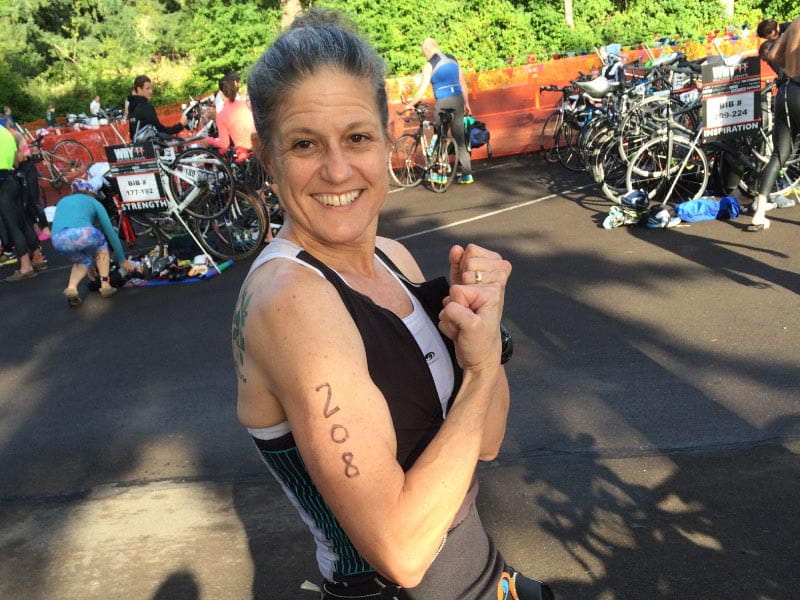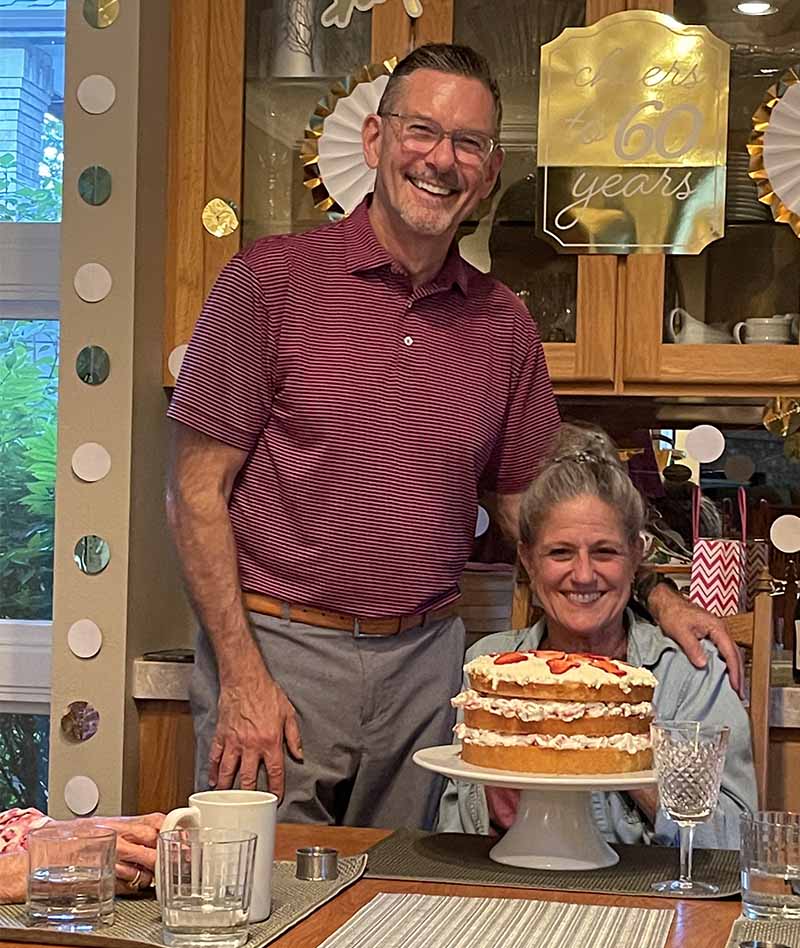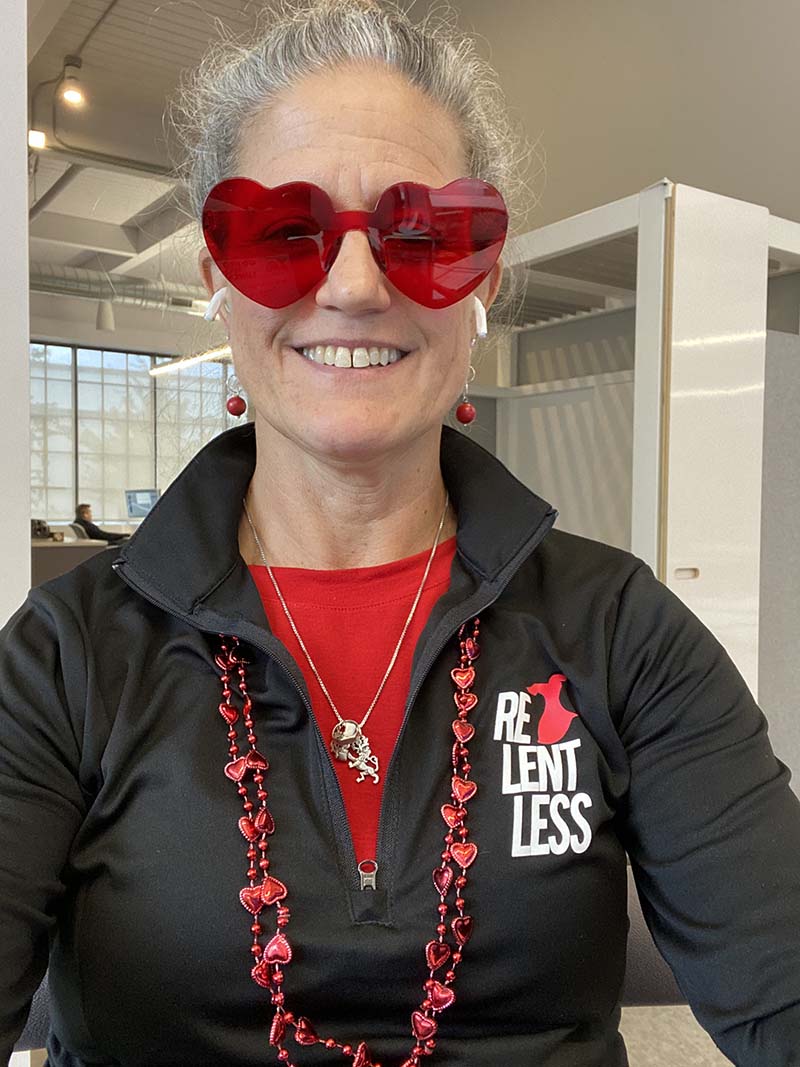Triathlete's pain was the start of a rare form of heart attack
By Diane Daniel, American Heart Association News

MaryKay West was at work in Portland, Oregon, after a long weekend in Southern California. Her husband, Jeff, had a work assignment there and she and their daughter, Anna, had visited. They'd gone for walks, shared nice meals and done a little sightseeing. And, as usual, MaryKay had gone for a run.
A competitive athlete since her youth, MaryKay was a state champion sprinter in high school and went on to become to a regionally ranked masters triathlete in her early 50s.
On this January morning, MaryKay arrived at work straight from the airport feeling energized.
After work, she was supposed to introduce a group of panelists at an event. Walking from her office to her car, her throat tightened. She felt like she couldn't swallow.
"That's weird," she thought.
Driving to the event, she felt pressure in her chest. It slowly moved up to her lower jaw.
At the event, she chatted with fellow commercial real estate professionals, hoping the pressure and pain would subside. Instead, it worsened, radiating into her arms.
After introducing the panelists, she whispered to a colleague that she wasn't feeling well and left.
Although she knew jaw and arm pain were symptoms of a heart attack, she also thought, "That's impossible. I'm healthy. I'm an athlete. I don't have high blood pressure. There's no reason I would have a heart attack."
At the hospital, MaryKay had normal blood pressure and heart rate readings. An electrocardiogram showed no problems.
But her symptoms continued.
"Something's not right," the doctor said.
She ordered a variety of tests. A blood test showed high levels of troponin, a sign that she'd had a heart attack.
Jeff arrived the next morning to find MaryKay feeling even worse.
On the monitor he saw that her blood pressure had spiked and asked for help. A trauma nurse arrived with a red "crash cart" stocked with emergency medical equipment in case of a cardiac arrest.
MaryKay's chest pain intensified, and her breath shortened.
"I'm really getting scared now," she told Jeff. She thought she might die.
A scheduled coronary angiogram was moved up. The procedure revealed MaryKay had a rare type of heart attack called a spontaneous coronary artery dissection, or SCAD. It isn't like a traditional heart attack, where a clot blocks blood from reaching the heart muscle. Rather, blood flow is squeezed off because of a separation, or tear, between the layers of the artery wall.
SCAD patients typically don't have heart disease risk factors. They're also fairly young, healthy and active. MaryKay was 56.
Doctors said the tear would heal itself and that she would be treated with medication. Four days later, she went home.
"I was very, very fatigued," she said. "And I could actually feel a pain in my heart where the tear was."
She wasn't allowed to use stairs for a week and could only walk on flat surfaces.
"I would walk five minutes a day, from the living room to the dining room, into the kitchen and down the hallway," she said.
She found community in an online group of SCAD survivors.
After a month, MaryKay started cardiac rehabilitation, which helped her understand her new limitations.
At the same time, her doctor strongly encouraged her to do physical activities only for fun, not for sport.
"The Type A competitive athlete side of me said, 'I'm going to get through rehab and get back into shape,'" she said. "But the other part of me was more realistic. It was very, very difficult emotionally."
Three years later, MaryKay has found the plus side of not competing. "Now, I do the same kinds of workouts my husband does, so we do more things together than we used to," she said.
For instance, in August they completed a 50-mile bicycle ride.

MaryKay is no stranger to health concerns. She is a breast cancer survivor, lost both of her parents to cancer and her brother and sister are cancer survivors. She was surprised to learn that heart disease is the No. 1 killer of women and that the majority of cardiovascular disease is preventable and easily treatable.
"Getting the message out about that is so critical," she said.
For the past four years, she has served on the Executive Leadership Team for the American Heart Association's Go Red for Women movement in Portland.

MaryKay had one incident 10 months after her SCAD, where she had extreme chest pain. She was scared it was a recurrence, but it wasn't. It could be treated with medication. About 30% of people who have had SCAD have a second occurrence.
Because of that experience, and her limitations, she thinks about her heart health every day.
"This is my reality. If it happens again, I know what to do," she said. "My heart is strong and I'm healthy, I take my meds and see my doctor regularly. If anyone has good odds to survive another SCAD, it's me."
Stories From the Heart chronicles the inspiring journeys of heart disease and stroke survivors, caregivers and advocates.
If you have questions or comments about this American Heart Association News story, please email [email protected].





